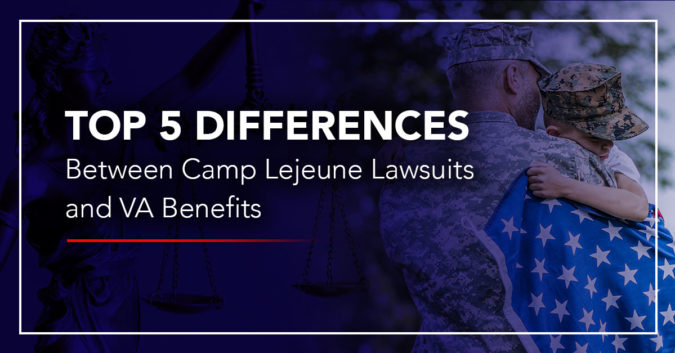Since President Joe Biden’s signing of the Promise to Address Comprehensive Toxics (PACT) Act on August 10, 2022, veterans who were exposed to toxic water at U.S. Marine Corps Base Camp Lejeune in North Carolina are eligible for a new form of compensation.
As part of the PACT Act, the Camp Lejeune Justice Act of 2022 allows eligible veterans and their families to file federal lawsuits to receive compensation for health issues they have endured as a direct result of contaminated water exposure at Camp Lejeune.
Compensation received through Camp Lejeune water contamination lawsuits does not in any way impact other benefits currently provided by the U.S. Department of Veterans Affairs (VA).
In other words, eligible veterans may receive compensation from Camp Lejeune lawsuits as well as their usual VA benefits simultaneously.
However, you only have until August 2024 to take legal action, and attorneys need time before then to collect crucial evidence for your case.
Since both resources are available at the same time for those who qualify, many veterans are left wondering about the difference between embarking upon a legal journey and receiving VA benefits.
Here are the top 5 differences between filing Camp Lejeune lawsuits and pursuing VA benefits:
1. The Need for an Attorney
Hiring a lawyer is highly advisable for maximizing your potential compensation.
Partnering with an experienced Camp Lejeune water contamination lawyer can help ensure the journey pursuing benefits and potential lawsuit litigation will progress as smoothly as possible.
A Camp Lejeune lawsuit is filed in federal court, so hiring a lawyer is highly advisable. Your lawyer will also be in communication with you throughout the process and can explain any requirements or updates that seem unclear.
2. Qualifying Health Conditions
Compared to VA benefits, a wider range of injuries and health effects may qualify for compensation from a Camp Lejeune water contamination lawsuit.
Camp Lejeune VA benefits cover eight presumptive illnesses for veterans:
- Adult leukemia
- Aplastic anemia and other myelodysplastic syndromes
- Bladder cancer
- Kidney cancer
- Liver cancer
- Multiple myeloma
- Non-Hodgkin’s lymphoma
- Parkinson’s disease
A lawsuit, however, is not limited to these eight illnesses. As a result, many additional health conditions caused by the water contamination at Camp Lejeune may also qualify for compensation for legal action, including:
- Birth defects
- Brain cancer
- Breast cancer
- Cardiac defects
- Cervical cancer
- Esophageal cancer
- Heart attacks
- Infertility
- Lung cancer
- Miscarriage
- Pancreatic cancer
- Prostate cancer
- Rectal cancer
Those who believe their health condition is related to Camp Lejeune water contamination may secure compensation with the support of Camp Lejeune attorneys.
3. Financial Assistance Options for Families
A lawsuit can secure funds for spouses, children, & other relatives.
It also allows qualified family members to receive financial compensation even on behalf of their loved ones who passed away decades ago.
In addition to veterans and their qualifying family members, other individuals exposed to the toxic water at Camp Lejeune include civilian workers, guardsmen, and reservists who were on base during the specified time period.
A Camp Lejeune lawsuit may also secure compensation for surviving family members of veterans who passed away decades ago.
4. Set Rates or Negotiable Amounts of Money
While VA benefits are allotted at set rates — such as a fixed monthly income based on a disability rating — a Camp Lejeune lawyer may be able to negotiate a higher settlement amount on your behalf.
In February 2022, the Congressional Budget Office shared in a published document that the projected estimate for Camp Lejeune settlements is more than $6.1 Billion over the next nine years.
This means that if you or your loved ones were harmed by the toxic water at Camp Lejeune, you may be eligible to receive some of that money in addition to VA benefits.
5. Source of Compensation
Lawsuits can secure additional money while you continue receiving VA benefits.
Money from a Camp Lejeune lawsuit does not come from the Department of Veterans Affairs.
As a result, filing a lawsuit does not in any way influence, adjust, or reduce the VA benefits that you’ve already received or will receive in the future.
These are separate forms of compensation — each with a different set of processes — and pursuing legal action does not jeopardize your current benefits.
File a Camp Lejeune Water Contamination Claim
If you’re a veteran, family member, or civilian who was exposed to contaminated water at Camp Lejeune for at least 30 days between August 1953 and December 1987, you may be eligible to file a Camp Lejeune lawsuit.
Even if your loved one passed away decades ago, you may now qualify for compensation from a Camp Lejeune wrongful death lawsuit on their behalf.
As an established national law firm, Sokolove Law has the experience and resources to help veterans and their families pursue justice. Over the last 45+ years, we’ve secured over $1.3 Billion on behalf of veterans across the country.
